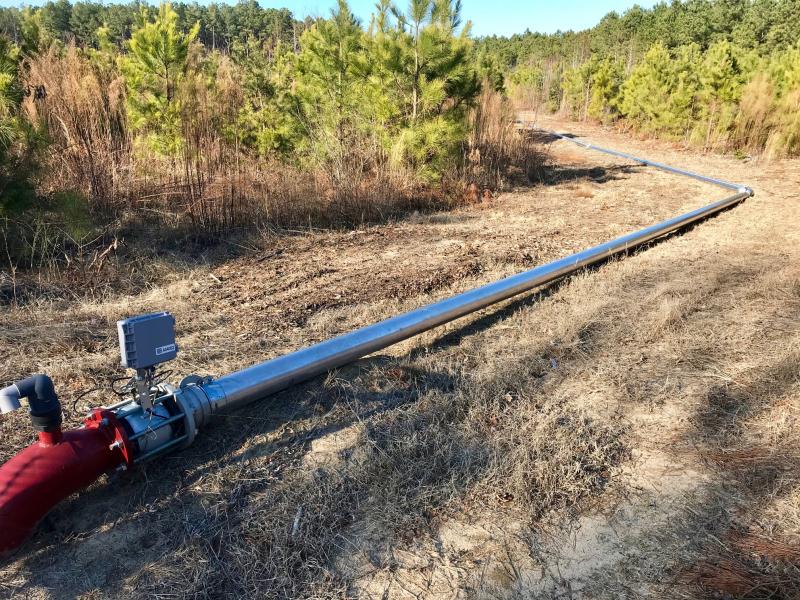Artesian building regional network to reclaim Sussex wastewater

Artesian Resources, a Delaware company that treats and provides water, is taking on tremendous environmental responsibility in Sussex County. And because of the direct linkage, especially because of our strong tourism industry, that environmental responsibility also translates into economic responsibility.
According to Artesian Wastewater President David Spacht, the company will soon have a wastewater and water reclamation system in Sussex County encompassing an estimated 26 miles of interconnected pipes linking existing treatment plants, spray irrigation equipment and all the associated pumps, monitoring wells and other hardware, software and employees to make it all work. That system, said Spacht, will also make Artesian a direct partner with several residential communities, Sussex County government, farmers, property owners and the poultry industry.
Residential communities? Those are developments – like Stonewater Creek north of Millsboro and The Trails at Beaver Creek in Harbeson – that contract with Artesian for water and wastewater services.
Sussex County government? Artesian contracts with the county’s engineering department to take treated wastewater at certain times of the year from its Inland Bays treatment plant a few miles south of Stonewater. The county has hundreds of acres of spray fields there, but in the winter when crops aren’t growing the sprayed water isn’t taken up and tends to pool in the fields.
The Stonewater Creek system has rapid infiltration basins that Artesian officials say add another level of treatment that keeps nitrogen levels below drinking-level standards. The Stonewater Creek development was built on agricultural fields where commercial fertilizer application over the decades created nitrate and phosphorus problems in the groundwater. “We’re introducing cleaner water back into the mass of groundwater beneath the community, which dilutes the problem and improves an existing situation,” said Artesian principal engineer Daniel Konstanski.
That means lower concentrations of nitrogen and phosphorus make their way into the Inland Bays. “We’re taking care of what's coming in and improving what’s already there.”
Farmers to benefit
Farmers? Artesian is making its way through a permitting process that will allow the company to begin using a recently constructed 90 million gallon lagoon system west of Milton to serve as a reservoir for treated wastewater including enough nutrients to be commercially valuable for area farmers. The water will be piped to spray irrigation systems for crop application. “The system is designed to promote and support cash farmland production,” said Konstanski. “It helps preserve farmland and keep productive land in the cycle.”
At this point, about 1,250 acres of 1,700 identified for spray irrigation have been permitted by the state for use.
Property owners? Artesian contracts with landowners to be able to work with farmers that may or may not be the property owners. Over 200 acres of an Isaacs-family-owned tree farm along Route 16 between Milton and Ellendale has been fully piped to allow constant, year-round application of treated wastewater to benefit growth of the pines.
And the poultry industry? This is the big one. Artesian has contracted with the Allen Harim chicken processing plant in Harbeson to take all of its treated wastewater, about 45 million gallons per month, for reclamation. That means 67 million gallons of the 90 million gallon capacity of the storage lagoons are allocated for the Allen Harim wastewater treated by that company before it arrives. “That incoming water will be highly monitored and will be sprayed on the fields when conditions allow,” said Kostanski, “and also in the trees all year long. The crops and the trees are the last stage of treatment. When they take up the water and use the nutrients, the water will be below the standard for acceptable nitrogen.”
When the system gets state go-ahead, those millions of gallons of wastewater treated by Allen Harim will be removed from Beaverdam Creek and the Broadkill River, where they have been disposed of for many decades.
The next phase of the system is a 625,000 gallon per day treatment plant for which permits are now being sought. ”That plant will augment the other residential plants in our service area,” said Spacht. “The water will be treated to a better than drinking water standard for nitrogen and discharged to the big lagoon for eventual use where it is needed. The way the system is designed, we can use whatever plants we need to handle excess loads – whatever loads and whatever times – to make the system balance.”
“We’re big believers in redundancy,” said Ginney Eisenbrey, assistant director of operations.
Rodney Wyatt, director of wastewater operations, said the new plant will be able to treat wastewater for up to 2,600 additional dwellings in Artesian’s service area. “We’re looking at 20 years of capacity.”
Spacht said the water and wastewater network will be the first true water reclamation system in Sussex County – a model for future relationships. “We think farmers will really like this when we get it up and running. They will save on commercial fertilizer and spread less chicken manure.”
The last reclamation system that Kostanski designed was in Texas. “Down there, two towns were fighting over who was going to get our water. This is what we do. We treat water.”
Now it’s up to Delaware’s Department of Natural Resources and Environmental Control to review and permit Artesian’s plans, and ensure that when the system is completely operational, it lives up to Artesian’s promises that the natural environment will not only be protected, but improved.




















































